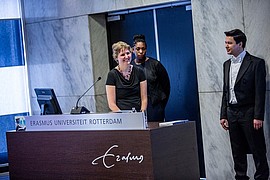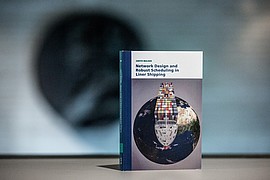PhD Defence: Judith Mulder

In her dissertation ‘Network Design and Robust Scheduling in Liner Shipping’, ERIM’s Judith Mulder proposes methods to design liner networks that maximize profit for the liner companies and methods to minimize total costs by reallocating buffer times and determining recovery policies specifying how to react on incurred delays.
Judith Mulder defended her dissertation in the Senate Hall at Erasmus University Rotterdam on Friday, 1 July 2016 at 9:30. Her supervisor was Prof. ir. R. Dekker (ESE) and her co-supervisor is Dr W.L. van Jaarsveld (Tue). Other members of the Doctoral Committee were Prof. R. Zuidwijk (RSM), Prof. L.G. Kroon (RSM), Prof.H.N. Psaraftis (DTU), Prof. D. Huisman (ESE) and Prof. A.W. Veenstra (Tue).
About Judith Mulder

Judith Mulder was born on July 22, 1988 in Delft. She received her bachelor's and master's degree from Erasmus University Rotterdam in Econometrics and Management Science, with a specialization in Quantitative Logistics and Operational Research. She also holds a bachelor's degree in Applied Mathematics from Delft University of Technology. In 2011, Judith started her PhD research at the Erasmus University Rotterdam. Her main research interest is operations research, in particular problems related to maritime transportation.
Judith has presented her research at various international conferences, such as EURO, IFORS, LOGMS, TSL Workshop, OR and ODYSSEUS. A paper on which the second chapter of her dissertation is based, has been published in the European Journal of Operational Research. The first chapter of this dissertation has been accepted for publication in a book on Ports and Networks.
Currently, Judith is a postdoctoral researcher at the Econometric Institute of the Erasmus University Rotterdam. She will among others work on the NWO-funded project ‘ISOLA’.
Thesis Abstract

Liner ships sail according to a published timetable specifying the arrival and departure times in ports. Liner shipping networks consist of cyclic routes that are usually serviced once a week. In this way, customers know when they can pick up or deliver their containers to a port. Each route in the network is sailed using one or more ships with possibly different capacities. The network is used to satisfy the given container demand between ports. Liner companies obtain a revenue for each container that they transport between two ports. Furthermore, they incur costs for operating the network: fixed ship costs, bunker costs, (un)loading and transshipment costs and lost sales costs. The first part of this thesis proposes methods to design liner networks that maximize profit for the liner companies.
Ships will incur delays when executing a route, resulting in uncertain arrival and departure times. Delayed arrivals can be very costly for liner companies, hence they want their schedules to be reliable. The reliability of a route can be increased by including buffer time in the route, which can be used to capture a delay without incurring delay costs. Furthermore, ships can reduce delays by speeding up, which brings about additional costs. The second part of this thesis proposes methods to minimize total costs by reallocating buffer times and determining recovery policies specifying how to react on incurred delays.
· View and download Judtih's dissertation
Photos: Chris Gorzeman / Capital Images


